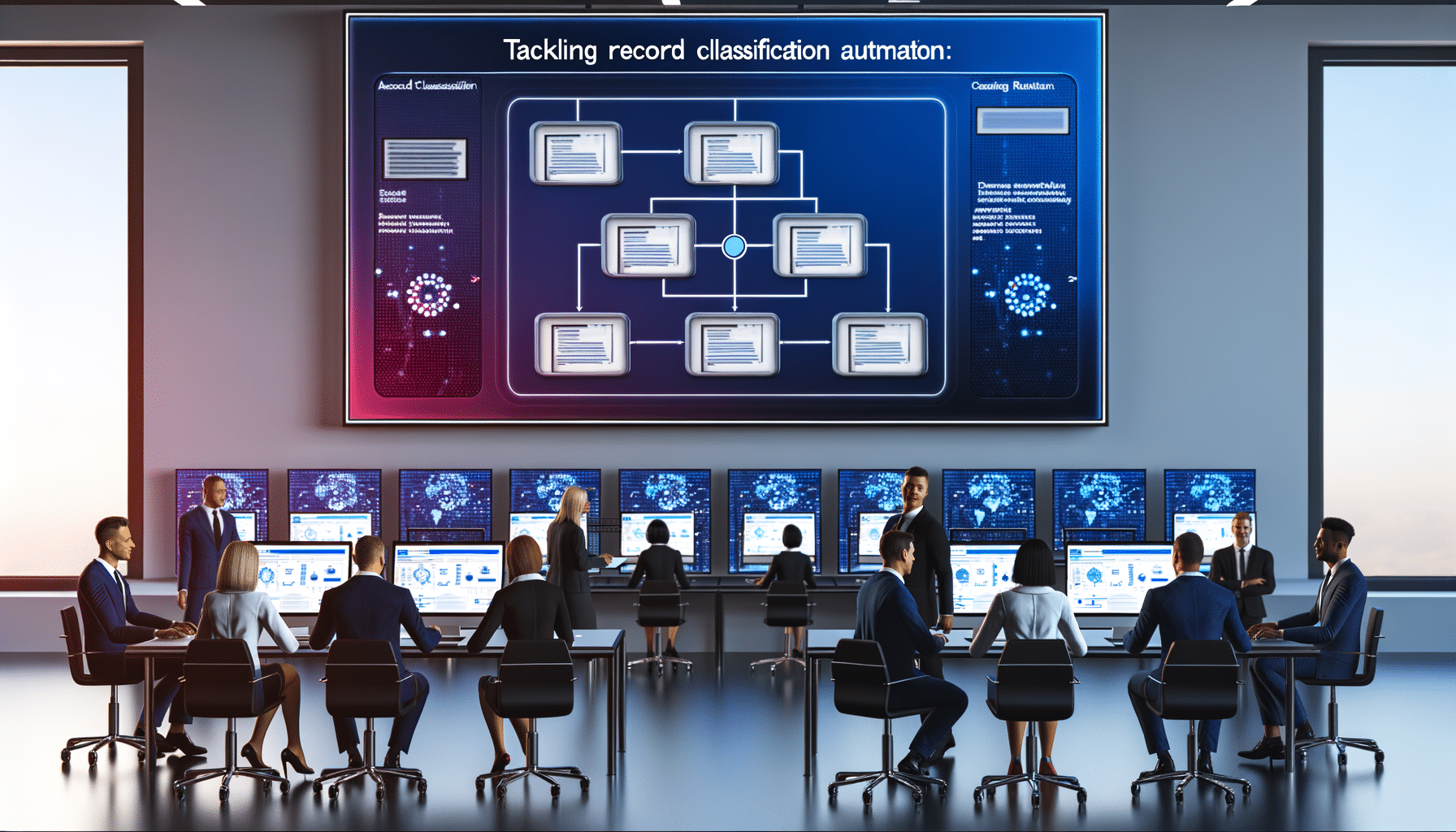- Physical Records Management
- November 16, 2024
Tackling Record Classification Automation

Revolutionizing Records Management through AI-Powered Classification
In today’s data-driven landscape, the responsibility of managing records is as daunting as it is crucial. The mountain of paperwork, digital files, and sensitive documents can often feel unmanageable. Having spent a significant part of my career in tech innovation and entrepreneurship, I faced similar issues firsthand. This is precisely why I founded RecordsKeeper.AI. Through automation, especially classification automation, I can help transform record management, transforming it from a cumbersome responsibility into a strategic edge for businesses, government departments, and even individuals.
The Game-Changer: Classification Automation
Automating the process of classifying records significantly relieves the burden of manual organisation. Utilizing advanced AI technology, classification automation is not just about simplifying processes; it ensures accuracy and efficiency at a level human intervention can rarely match.
AI-powered classification systems intelligently analyze and categorize documents based on predefined criteria. This isn’t merely a “nice-to-have” feature—it’s essential in today’s fast-paced world where decisions rely on swift data retrieval.
How Does It Work?
One of the marvels of AI is its ability to learn and adapt. Here’s how classification automation benefits records management:
- Data Analysis: AI algorithms thoroughly analyze an incoming record, deciphering its content and context.
- Classification: The AI system then categorizes the record based on the established parameters, whether that’s client details, transaction dates, or compliance relevance.
- Retrieval Ease: Once tagged, these records can then be effortlessly retrieved using natural language queries. This means one could simply type “last year’s invoices” to obtain relevant documents, saving endless hours of sifting through records manually.
Benefits: More Than Just Saving Time
The implications of introducing automation into records classification go beyond time-saving:
- Consistency and Accuracy: With AI removing human bias, records are consistently categorized correctly, decreasing risks of compliance violations or misfiled data.
- Scalability: Whether you’re handling a hundred or a million records, AI can scale effortlessly to meet your growing needs.
- Cost-Effectiveness: By reducing the manpower needed for manual record-keeping, organizations can redistribute resources to where they are most needed.
Security and Compliance: AI’s Role in Safeguarding Data
In an era where data breaches are not uncommon, records management requires robust security measures. Here, AI also plays a crucial part. By integrating Blockchain technology, records are stored as immutable pieces of data, ensuring regional compliance requirements are met, like GDPR, HIPAA, and SOX.
Moreover, RecordsKeeper.AI’s secure data rooms enable the distribution of sensitive files with controlled access, enhancing confidentiality and facilitating compliance without added complexities.
Audit-Ready Systems: The Future of Compliance Management
Record keeping isn’t just about storage; it’s also about ensuring audit readiness. Our AI-driven platform automatically maintains audit trails, providing organization heads with comprehensive logs and reports. These logs are invaluable for pinpointing access and changes, vital during regulatory audits.
Driving Strategy with AI-Powered Records Management
For legal, finance, and compliance managers—often at the helm of records management—automation offers a newfound strategic advantage. Accurate and swift data retrieval transforms decision-making. Suddenly, records are not just historical artifacts but actionable intelligence.
On our journey at RecordsKeeper.AI, what I found surprising is how often record management frustration stems from outdated methodologies. With AI as a catalyst, suddenly, records management wasn’t an overhead, but an enabler.
Looking Ahead: Embrace the Change
The future lies in embracing these technological advancements. Classification automation is no longer a futuristic concept but a real solution for managing records and more. It’s about empowering organizations—like yours—to shift your focus to strategic planning and innovation rather than drowning in paperwork.
For anyone in charge of record-keeping, now is the time to consider how AI and Blockchain can revolutionize the way you work. Stay ahead of the curve by reimagining record management processes, ultimately enhancing efficiency, security, and compliance with the help of RecordsKeeper.AI.
Feel inspired to explore further? Connect with me, Toshendra Sharma, and dive deeper into the transformational journey AI and Blockchain can create for your records management systems.
Toshendra Sharma is the visionary founder and CEO of RecordsKeeper.AI, spearheading the fusion of AI and blockchain to redefine enterprise record management. With a groundbreaking approach to solving complex business challenges, Toshendra combines deep expertise in blockchain and artificial intelligence with an acute understanding of enterprise compliance and security needs.
Related Posts

Managing Paper Records in a Digital Office
Handling remaining paper records in digital environments.
- November 28, 2024

Organizing Records for Multiple Client Versions
Tracking different versions of client documentation effectively.
- November 27, 2024
Archives
- January 2025
- December 2024
- November 2024
- October 2024
- September 2024
- August 2024
- July 2024
- June 2024
- May 2024
- April 2024
- March 2024
- February 2024
- January 2024
- December 2023
- November 2023
- October 2023
- September 2023
- August 2023
- July 2023
- June 2023
- May 2023
- April 2023
- March 2023
- February 2023
- January 2023
- December 2022
- November 2022
- October 2022
- September 2022
Want to get more content like this?
Signup to directly get this type of content to your inbox!!
Latest Post
Document Control for Equipment Maintenance
- January 20, 2025
Managing Records for Multiple Clients
- January 19, 2025
Handling Conference Documentation
- January 18, 2025
Setting Up Department Record Reviews
- January 17, 2025





